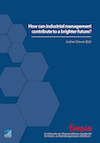Search


Bibtex
Cite as text
@Inbook{Sihn+Reichsthaler+Toth+Kohl+Greimel,
Cite-key = "Sihn2023WGAB",
Year= "2023",
Volume= "Schriftenreihe der Wissenschaftlichen Gesellschaft für Arbeits- und Betriebsorganisation (WGAB) e. V.",
Pages= "1-11",
Journal = "WGAB",
Title= "Maintenance-Free Factory",
Author= "Wilfried Sihn, Luisa Reichsthaler, Daniel Toth, Linus Kohl, Lisa Greimel; Fraunhofer Austria Research GmbH",
Doi= "https://doi.org/10.30844/wgab_2023_1",
Abstract= "For decades, different approaches have been designed and implemented for optimizing maintenance management systems in manufacturing, but maintenance is still known as a cost driver rather than an enabler or driver of value creation in production management. The challenges for companies facing this change are many, ranging from doubts about the economic efficiency of maintenance to lack of data and flexibility in the maintenance organization to shortage of skilled workers and lack of prioritization of sustainability and resilience.
The vision of the Maintenance-Free-Factory (M2F) is to harness the potential of digitalisation as a driver of sustainability and resilience, enabling a fundamental transformation of maintenance. At the heart of the M2F is value-added production without maintenance disruption. Maintenance activities are carried out during unproductive production times. Therefore, five elements – digital maintenance processes, data-based maintenance, decision support systems, maintenance workers, and sustainable maintenance – have been designed.
The concept aims to explore the untapped potential to transform maintenance into an important enabler considering a holistic view of value creation processes. Key next steps for the implementation are consistent use of data, integration of planning, flexibility, sustainability and the development of a step-by-step roadmap.",
Keywords= "decision support system, sensor-based material flow planning, operations research, intralogistics, public transport",
}
Wilfried Sihn, Luisa Reichsthaler, Daniel Toth, Linus Kohl, Lisa Greimel; Fraunhofer Austria Research GmbH(2023): Maintenance-Free Factory. Schriftenreihe der Wissenschaftlichen Gesellschaft für Arbeits- und Betriebsorganisation (WGAB) e. V.(2023), S. 1-11. Online: https://doi.org/10.30844/wgab_2023_1 (Abgerufen 24.02.26)
Open Access
Abstract
Abstract
For decades, different approaches have been designed and implemented for optimizing maintenance management systems in manufacturing, but maintenance is still known as a cost driver rather than an enabler or driver of value creation in production management. The challenges for companies facing this change are many, ranging from doubts about the economic efficiency of maintenance to lack of data and flexibility in the maintenance organization to shortage of skilled workers and lack of prioritization of sustainability and resilience. The vision of the Maintenance-Free-Factory (M2F) is to harness the potential of digitalisation as a driver of sustainability and resilience, enabling a fundamental transformation of maintenance. At the heart of the M2F is value-added production without maintenance disruption. Maintenance activities are carried out during unproductive production times. Therefore, five elements – digital maintenance processes, data-based maintenance, decision support systems, maintenance workers, and sustainable maintenance – have been designed. The concept aims to explore the untapped potential to transform maintenance into an important enabler considering a holistic view of value creation processes. Key next steps for the implementation are consistent use of data, integration of planning, flexibility, sustainability and the development of a step-by-step roadmap.
Keywords
Schlüsselwörter
decision support system, sensor-based material flow planning, operations research, intralogistics, public transport

 English
English